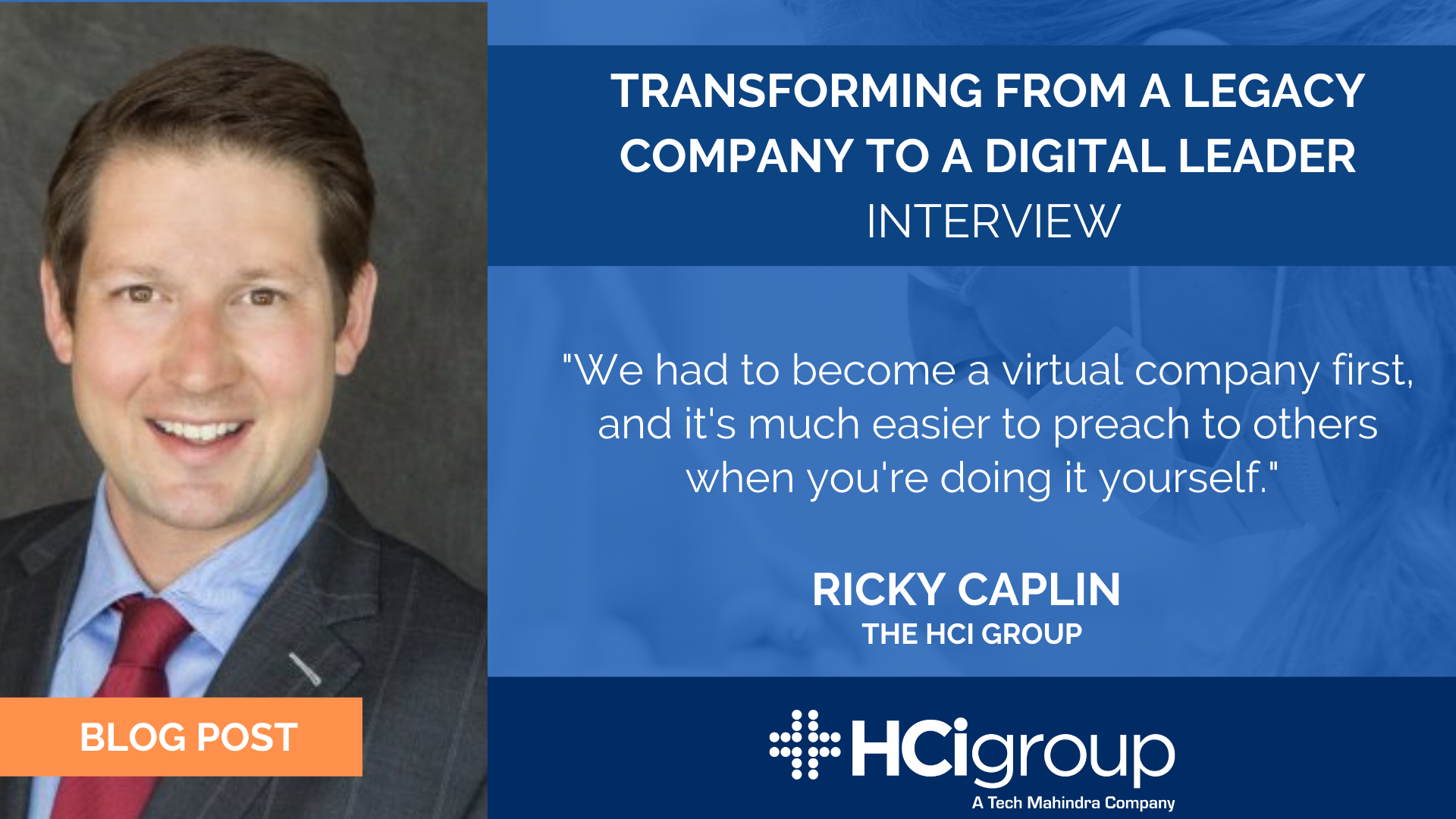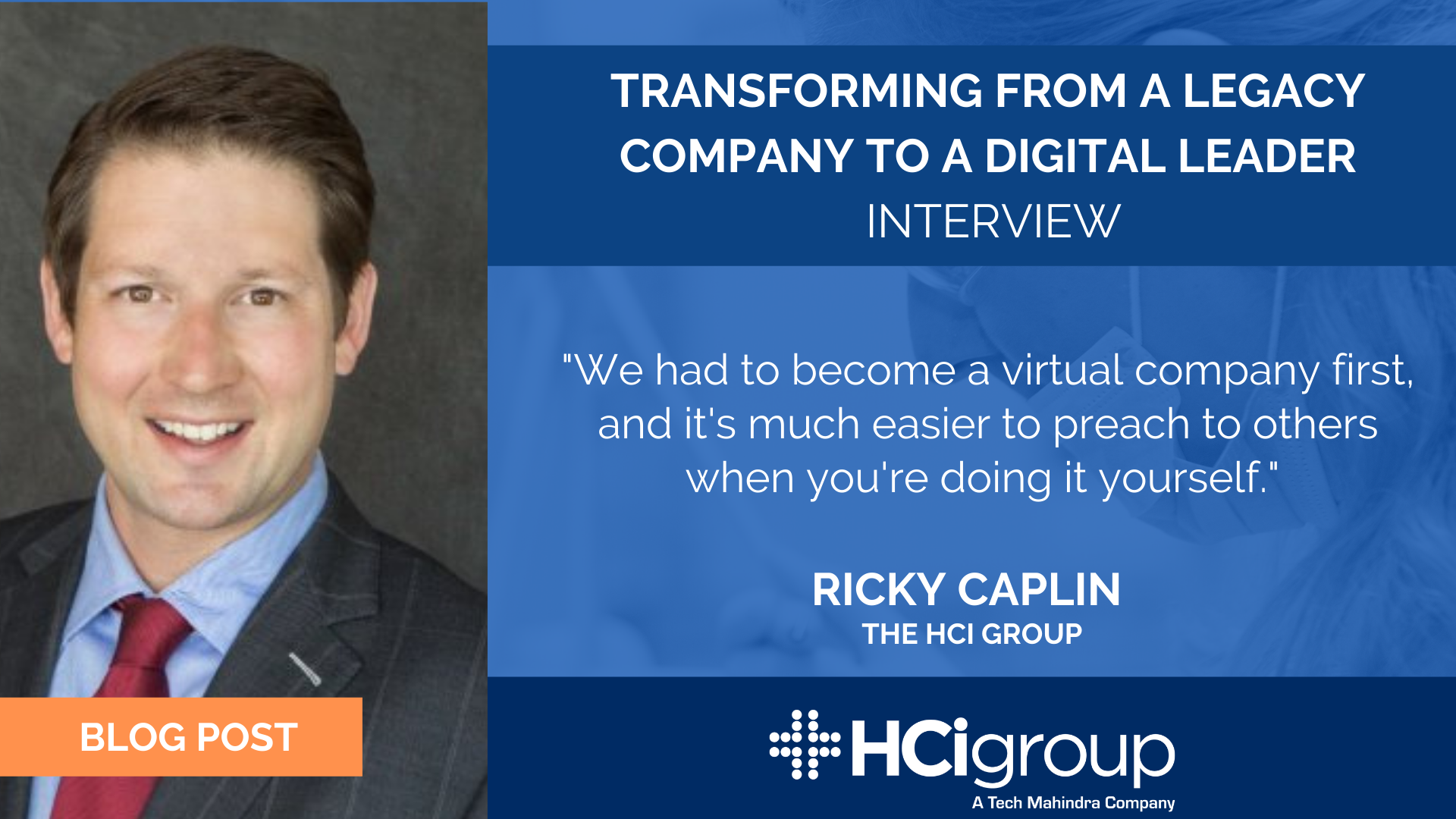Transitioning to a Digital Business Leader: A Q&A with Ricky Caplin


“Digital transformation” was a distant concept when Ricky Caplin co-founded The HCI Group in 2009, but today it is the heart of what the company does and the essence of what it has become.
As a global healthcare IT consulting firm, The HCI Group strives to make the industry a leading adopter of digital technology. Its efforts are rooted in its own experience in digital transformation.
Caplin reflected on how The HCI Group transformed from a legacy company to a digital one during a DGTL Voices podcast interview with Chief Digital Officer Ed Marx. The two leaders also discussed topics such as leadership and digital transformation within healthcare. This blog post contains excerpts from their discussion.
Growing The HCI Group
Marx: Ricky, tell us, how did you get there? What’s your story?
Caplin: The HCI Group started in a townhome in Atlanta with my brother-in-law and best friend, Greg Jones. We didn't know much at the time, but we knew we were going to just give it all we had, and we've been truly blessed.
Our initial legacy company was doing strategy, implementation, training, and support of electronic health records. So, we became one of the big players in the Epic and Cerner, and MEDITECH space.
Eventually, we realized we needed to change. We were fortunate to have had significant growth and had a number of acquirers that were interested in us. We wound up selling to Tech Mahindra, and a big part of that equation was the ability to transform our business from a time-and-expense business doing strategy and implementation work to a company that did managed services and had great digital transformation capabilities.
I'd like to say we've successfully done that, and it has come together nicely. We've had significant growth and our business model has shifted from project-based work and staff augmentation to large-scale digital transformation efforts and managed service engagements.
Transitioning from legacy services provider to digital transformation leader
Marx: It's a difficult transition for a company to go from legacy services to a digitally transformative company that not only is transforming digitally itself internally but, as you just described, externally as well. How were you able to do that?
Caplin: There was a lot of pain at the beginning. We knew what we wanted to become but we didn't know how to become it.
We were on QuickBooks and basic accounting systems. We had to transform the way we did things internally first. There were some pains in moving to new accounting systems and HR systems, investing in HR, and bringing in a key leadership team that understood digital transformation, you being one of those key hires as our chief digital officer. We really invested in talent.
We also took the time to study and understand the capabilities of Tech Mahindra. We had to reskill our workforce, not just our consultants, but our sales teams. They had been selling implementation services. Frankly, we didn't even know what digital transformation was.
Also, I like to share that we preached one thing and didn't necessarily do it as a company but COVID forced us to do that. We went virtual literally over a weekend, and that shined a lot of light on inefficiencies.
I was probably the biggest naysayer of, “We've got a lot of young employees, are they gonna be productive? Or are they just gonna go watch Netflix or goof around?” And I'm happy to say that I was wrong, and the teams just executed. I made the comment, “I don't think we ever need to go back to the office space.” So, we lucked out because COVID shined a light on what we had to do.
We had to become a virtual company first, and it's much easier to preach to others when you're doing it yourself.
Identifying opportunities
Marx: Originally, you just really focused on the provider side, but now you have a very broad focus for all of health and life sciences and digital transformation in these other sectors, like pharma and payer side [as CEO of Healthcare & Life Sciences at Tech Mahindra, which acquired HCI in 2017]. Can you speak to anything exciting that you might be doing in some of these areas other than the provider side? Where do you see opportunity?
Caplin: As I've learned more about the payer side and life sciences, which are pharmaceutical companies and medical device companies, I've realized that they are a bit more mature in their adoption of technology and managed services, and automation.
However, we're all in the same business. We're all taking care of a patient in different capacities and there's overlap. So, we've tried to focus on what is the overlap? What is our story? And how does that relate across healthcare verticals?
We decided early on that we were going to make a big bet on all things virtual health. Then we started down a path of creating what the vision would be for a fully enterprise virtual health platform.
Then, COVID happened. Everyone went from five telehealth visits to 5,000 telehealth visits overnight. So, we started building out and investing in a platform which is now a new company called HealthNxt. HealthNxt is an all things virtual health, fully integrated platform using some of our best-in-class digital transformation capabilities and human-centered design principles. We’ve built that and now we have our first enterprise customers. A consortium of various health systems and health organizations are co-investing in it and it's exciting. I see this as a platform that's going to cross into the payer space and the life science space.
Payers are already needing remote patient monitoring and things like that, and we’ve already had success with payers. If you think about life science, there are tremendous opportunities around things like medication adherence and how they make patients adopt their drugs and properly use them. They're also making significant investments in things like health clouds.
I also think when you look in the industry specifically, there are a lot of opportunities. For instance, some of the software companies that we work with, like Epic, are having tremendous success in the payer space. Now, that's a natural segway for us to do some of the things we've always done.
These are just a few examples of how it's changed. I'm certainly still learning and getting some good advisors to teach me and help us.
Being a digital leader
Marx: You just mentioned that you're listening to other people, you're listening to advisors. So, it requires a lot of humility to be a leader. What are some of your expectations of leaders and digital leaders?
Caplin: I don't even know if I could be considered a digital leader. Most of the chief digital officers that I know are brilliant minds that understand so much more than I do. I guess one of the advantages is that I'm a CPA by training turned entrepreneur that's learned healthcare and technology. I certainly can't practice. But because I don't think I have the answers, that's an advantage for me. I have to be humble because I can't do it. I depend upon some of the advisors and relationships I have. My job is to facilitate and hopefully create the solutions that are needed.
Most chief digital officers that I've met with are innovative, are willing, and are either coming from outside industry or are looking from other industries that have had more digital transformation. I think just being a constant learner or listener helps.
Something else that I'm seeing be done successfully is what I call “carve-outs” or “joint ventures.” A chief digital officer wants to create something but instead of solving the problem just for their health system, they may bring in a couple of other organizations having the same problem. Then you have something where you can not only solve the problem but have something that can scale and continually innovate. That's an opportunity for chief digital officers to think about: “Instead of me solving all the problems, how do I have an ecosystem of innovation and entrepreneurship that can solve the problems?” Not only do you get to solve your problem, but you may also create a revenue stream for your organization.
Marx: It really is about that collaboration and partnering more than we ever have before, and that's what I like too.
Ricky, what you were saying when you were talking about all of health and life sciences, how some of the same solutions go across all those silos. In the past, what held us back from transformation was silo thinking.
Now, there's this new digital era. The way that you've positioned your company is that we are cross collaborators and taking the best practices that we can learn from these other areas, these other verticals, and bringing them together and eliminating the redundancies, the inefficiencies, and so forth. Really good stuff.
